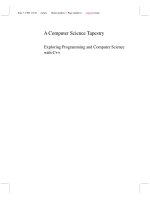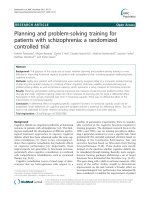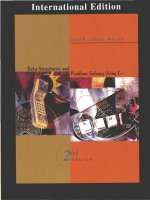programming and problem solving with c++ 6th by dale ch08
Bạn đang xem bản rút gọn của tài liệu. Xem và tải ngay bản đầy đủ của tài liệu tại đây (611.11 KB, 57 trang )
Chapter 8
Functions
Chapter 8 Topics
Writing a Program Using Functional
Decomposition
Writing a Void Function for a Task
Using Function Arguments and Parameters
Chapter 8 Topics
Differences between Value Parameters
and Reference Parameters
Using Local Variables in a Function
Function Preconditions and
Postconditions
Functions
Every C++ program must have a
function called main
Program execution always begins
with function main
Any other functions are
subprograms that must be explicitly
called
Function Calls
One function calls another by using the
name of the called function followed
by ()s that enclose an argument list,
which may be empty
A function call temporarily transfers
control from the calling function to
the called function
Function Call Syntax
FunctionName( Argument List )
The argument list is a way for functions to
communicate with each other by passing
information
The argument list can contain 0, 1, or more
arguments, separated by commas,
depending on the function
Two Parts of Function Definition
int Cube(int n)
{
heading
return n * n * n; body
}
What is in a heading?
type of value
returned
name of
function
int Cube (int n)
parameter list
Prototypes
A prototype looks like a heading but must
end with a semicolon, and its parameter
list needs only to contain the type of each
parameter
int Cube(int ); // Prototype
Function Calls
When a function is called, temporary
memory is allocated for:
its value parameters;
any local variables; and
for the function’s name if the return
type is not void
Flow of control then passes to the first
statement in the function’s body
Function Calls
The called function’s statements are
executed until a return statement
(with or without a return value) or the
closing brace of the function body is
encountered
Then control goes back to where the
function was called
#include <iostream>
int Cube(int);
// prototype
using namespace std;
void main()
{
int yourNumber;
arguments
int myNumber;
yourNumber = 14;
myNumber = 9;
cout << “My Number = “ << myNumber;
cout << “its cube is “ << Cube(myNumber)
<< endl;
cout << “Your Number = “ << yourNumber;
cout << “its cube is “ <<
Cube(yourNumber)
<< endl;
}
Successful Function Compilation
Before a function is called in your
program, the compiler must have
previously processed either:
the function’s prototype or
the function’s definition (heading
and body)
Return Values
In C++, a value-returning function
returns in its identifier one value of
the type specified in its heading and
prototype (called the return type)
In contrast, a void-function cannot
return any value in its identifier
Example
Write a void function called DisplayMessage(),
which you can call from main(), to describe the
pollution index value it receives as a parameter
Your city describes a pollution index
less than 35 as “Pleasant”,
35 through 60 as “Unpleasant”,
and above 60 as “Health Hazard”
parameter
void DisplayMessage(int index)
{
if(index < 35)
cout << “Pleasant”;
else if(index <= 60)
cout << “Unpleasant”;
else
cout << “Health Hazard”;
}
The Rest of the Program
#include <iostream>
void DisplayMessage(int); // Prototype
using namespace std;
int main()
{
The Rest of the Program, cont...
cout << “Enter air pollution index”;
cin >> pollutionIndex;
DisplayMessage(pollutionIndex); // Call
return 0;
}
argument
Return Statement
return; // No value to return
Is valid only in the body block of a void
function
Causes control to leave the function and
immediately return to the calling block,
leaving any subsequent statements in the
function body unexecuted
Header Files
Header Files contain
Named constants like
INT_MAX = 32767;
const int
Function prototypes like float sqrt(float);
Classes like
string, ostream, istream
Objects like
cin, cout
Program with Several Functions
function prototypes
main function
Square function
Cube function
Value-Returning Functions
#include <iostream>
int Square(int); // Prototypes
int Cube(int);
using namespace std;
int main()
{
cout << “The square of 27 is “
<< Square(27) << endl;
cout << “The cube of 27 is “
<< Cube(27) << endl;
return 0;
}
function calls
Rest of Program
int Square(int n)
{
return n * n;
}
// Header and body
int Cube(int n)
// Header and body
{
return n * n * n;
}
Void Functions Stand Alone
#include <iostream>
void DisplayMessage(int);// Prototype
using namespace std;
int main()
argument
{
DisplayMessage(15); // Function call
cout << “Good Bye“ << endl;
return 0;
}
Parameters
parameter
void DisplayMessage(int n)
{
cout << “I have liked math for
“
<< n << “ years”
<< endl;
return;
}









